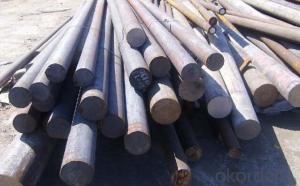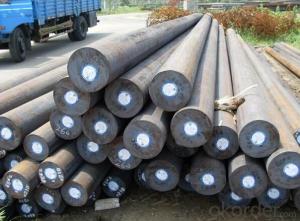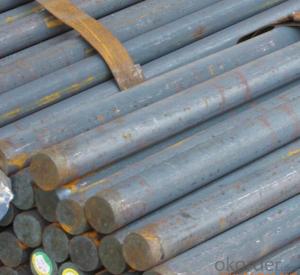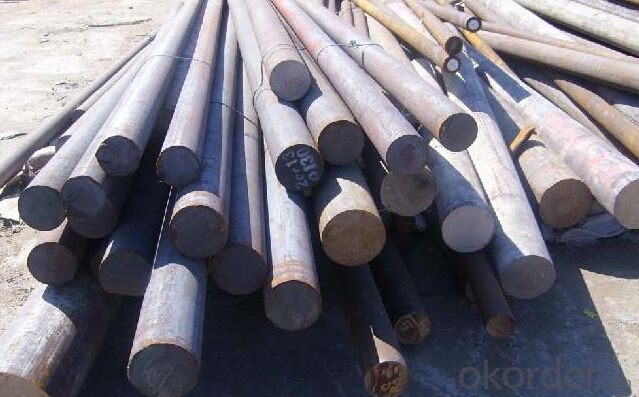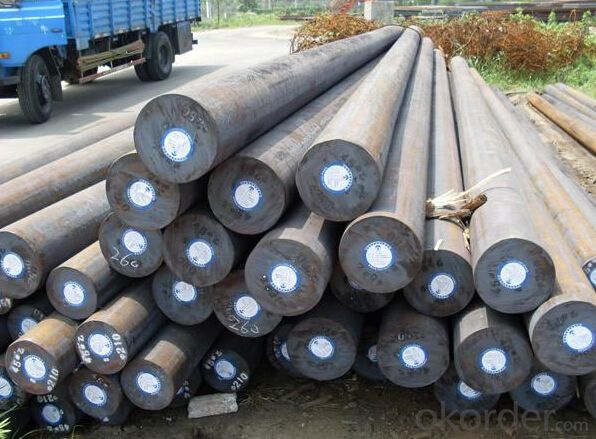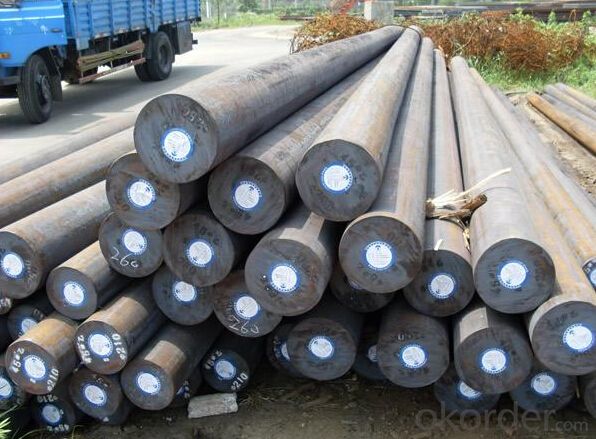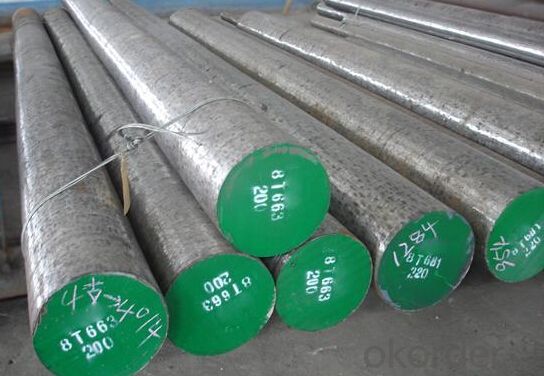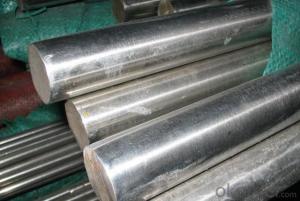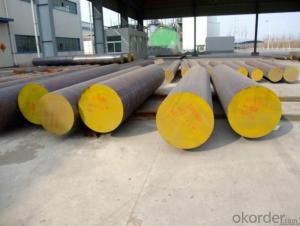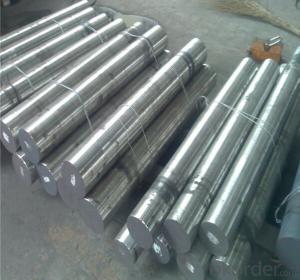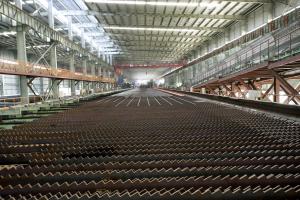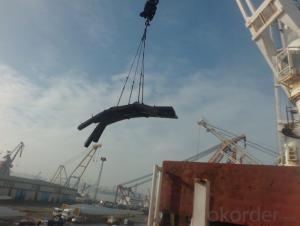Hot Rolled Carbon Steel Round Bar with high quality
- Loading Port:
- Tianjin
- Payment Terms:
- TT OR LC
- Min Order Qty:
- 3 m.t.
- Supply Capability:
- 10000 m.t./month
OKorder Service Pledge
OKorder Financial Service
You Might Also Like
Specification
Carbon Steel Round Bar with high quality
Name | Carbon Steel Round Bar |
Shape | Round Bar/Square Bar/Flat Bar/Plate/Wire |
Standard | GB/ASTM/SAE/AISI/DIN/JIS/EN/BS |
Surface Treatment: | Black/Peeling/Polished/Machined |
Delivery Condition: | Hot Rolled or Forged/Peeled or Black Surface |
Test | SGS/UT 100% Elements Testing |
Certificate: | ISO/Mill Certificate |
Service: | 24 hours online service / |
more than 20 years trading and manufacture | |
Quality Assurance: | the third party inspection, such as SGS, BV, TUV…etc. is acceptable |
Packaging Details: | seaworthy packaging or as per customer's packing instruction |
Specification
Description | Carbon Steel Rod/Carbon Steel Bar,carbon steel rod,carbon steel shaft,mild steel bar, mild steel shaft,ms bar | |
Material | ASTM | 1005,1006,1008,1010,1015,1020,1025,1030,1035,1040,1045,1050,1055,1060,1065,1070,1080,1084,1016,1022 |
DIN | Ck10,Ck15,Ck22,Ck25,Ck30,Ck35,Ck40,Ck45,Ck50, 30Mn4,40Mn4 | |
Standard | GB/T799,ASTM A29,A108,A321,A575,BS970,DIN1652,JIS G4051 | |
Section shape | Round | |
Length | As your required | |
| Carbon steel rod applies to chemical industry, shipping industry,manufacturing industry,construction, | |
Application | decorate Industry,electric power,pump shafts, sanitary wares,furniture handles,boiler,high temperature resistant,low temperature resistant, corrosion resistant. | |
Packaging & Delivery
Packaging Detail | Sea worthy packing /as per customer's packing instruction |
Delivery Detail | 15 ~ 40 days after receiving the deposit |
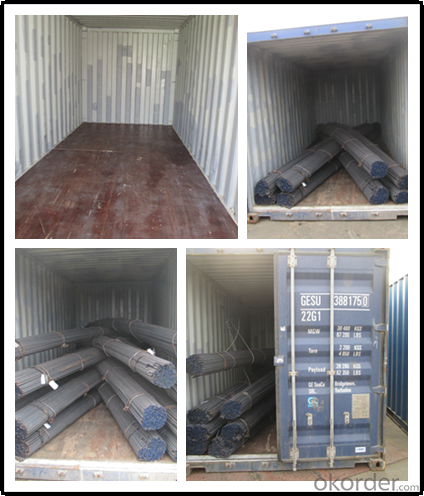
Product Show
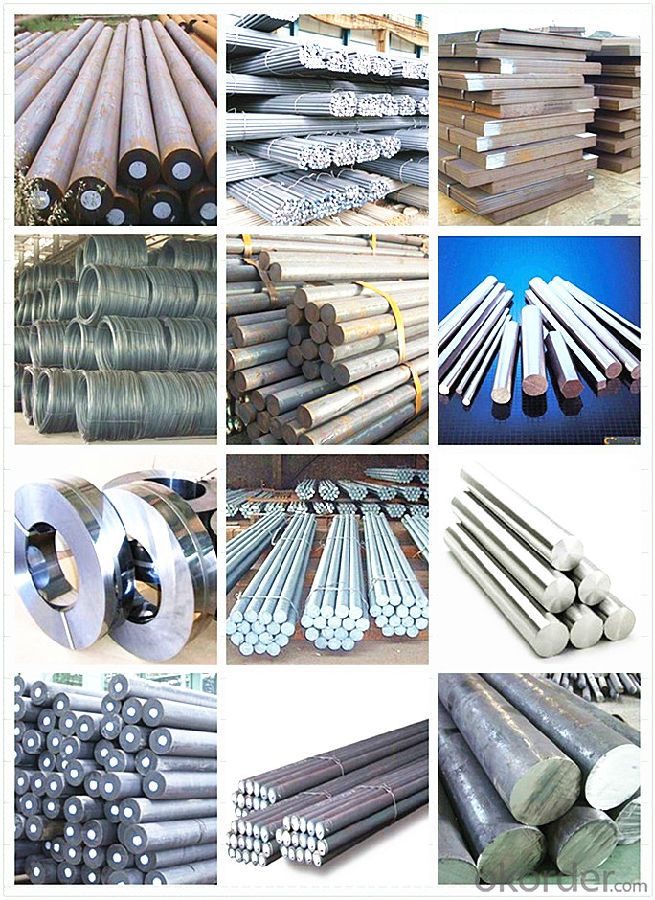
Workshop
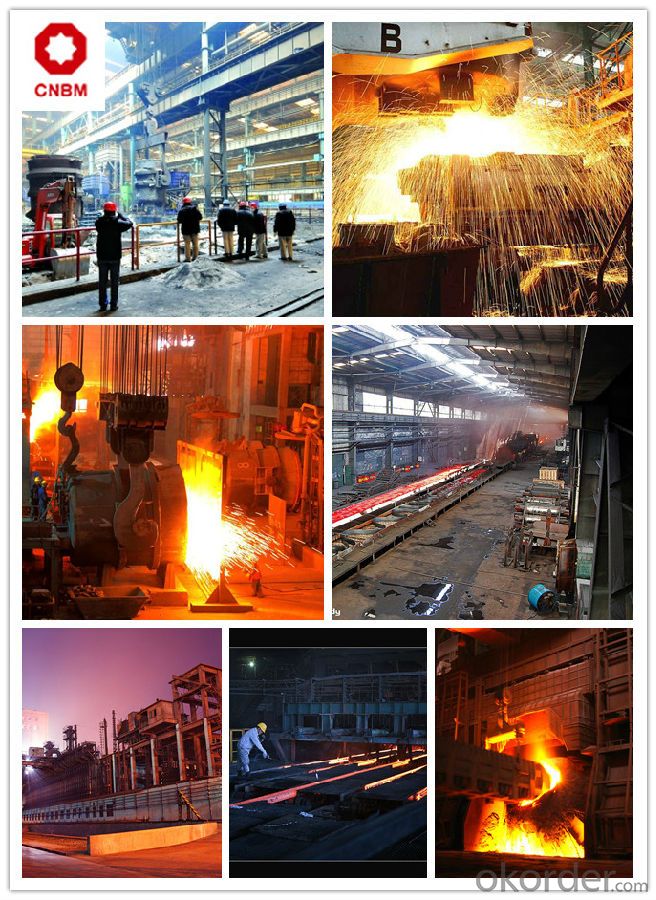
FAQ
Are you a trading company or manufacturer? | Manufacturer |
What’s the MOQ? | 3 metric ton |
What’s your delivery time? | 15-35 days after downpayment received |
Do you Accept OEM service? | Yes |
what’s your delivery terms? | FOB/CFR/CIF |
What's the Payment Terms? | 30% as deposit,70% before shipment by T/T |
Western Union acceptable for small amount. | |
L/C acceptable for large amount. | |
Scrow ,Paybal,Alipay are also ok | |
Why choose us? | Chose happens because of quality, then price, We can give you both. |
Additionally, we can also offer professional products inquiry, products knowledge train (for agents), smooth goods delivery, excellent customer solution proposals. | |
What's your available port of Shipment? | Main Port, China |
What’s your featured services? | Our service formula: good quality+ good price+ good service=customer's trust |
Where are your Market? | Covering more than 160 countries in the world |
- Q: What are the main applications of special steel in the marine sector?
- Special steel is widely used in the marine sector for various applications. Some of the main applications include the construction of ship hulls, offshore structures, and marine equipment. The high strength and corrosion resistance properties of special steel make it ideal for withstanding the harsh conditions and corrosive environment of the sea. It is also used in the manufacturing of propeller shafts, marine engine components, and marine pipelines, ensuring durability and reliability in marine operations. Overall, special steel plays a crucial role in enhancing the safety, efficiency, and longevity of marine structures and equipment.
- Q: What are the non-destructive testing methods used for special steel?
- Special steel can be evaluated for flaws or defects using various non-destructive testing (NDT) methods. These techniques are designed to identify issues in the material without causing any harm. Ultrasonic testing is a prevalent NDT method for special steel. It involves transmitting high-frequency sound waves through the steel and analyzing the reflected echoes. By measuring the time it takes for the sound waves to travel through the steel and return, technicians can determine the material's thickness, density, and internal structure. This method is highly effective in detecting cracks, voids, or inclusions in the steel. Magnetic particle testing is another commonly used NDT method for special steel. It requires applying a magnetic field to the steel's surface and coating it with magnetic powder. Any irregularities or defects in the steel will result in magnetic flux leakage, causing the magnetic particles to cluster and create visible indications. This technique is particularly useful in identifying surface cracks or discontinuities. Liquid penetrant testing is frequently employed for NDT of special steel. It entails applying a liquid dye or fluorescent substance to the steel's surface. The dye penetrates any surface cracks or defects, and after a specified time, excess dye is removed. A developer is then used to draw out the dye from any flaws, making them visible under UV light. This method effectively detects surface discontinuities and is commonly utilized in the aerospace and automotive industries. Radiographic testing is another NDT method applicable to special steel. This procedure involves exposing the steel to X-rays or gamma rays and capturing the resulting image on film or a digital detector. Technicians can analyze the radiographic image to identify internal flaws like cracks, voids, or inclusions in the steel. This method is particularly advantageous for thicker sections of steel or situations where accessing the material is challenging. In conclusion, non-destructive testing methods, including ultrasonic testing, magnetic particle testing, liquid penetrant testing, and radiographic testing, are frequently employed for special steel. These methods ensure the detection of flaws or defects without causing any damage to the material, thereby ensuring its integrity and reliability.
- Q: How does special steel contribute to the performance of cutting tools?
- Special steel contributes to the performance of cutting tools in several ways. Firstly, it offers exceptional hardness and strength, enabling the cutting tool to withstand the high forces and pressures encountered during cutting. This durability ensures that the tool remains sharp for longer periods, reducing the need for frequent replacements. Additionally, special steel also possesses excellent heat resistance, preventing the tool from overheating and maintaining its cutting ability. Moreover, special steel can have specific alloying elements that enhance wear resistance, corrosion resistance, and toughness, further improving the performance and lifespan of cutting tools. Overall, the use of special steel in cutting tools enhances their efficiency, reliability, and longevity, resulting in improved cutting precision and reduced downtime.
- Q: What are the properties of high-strength tool steel?
- High-strength tool steel possesses excellent hardness, wear resistance, and toughness. It has the ability to retain its sharpness, withstand high temperatures, and resist deformation. This type of steel is also known for its high strength-to-weight ratio, making it ideal for heavy-duty applications in industries such as manufacturing and construction.
- Q: Can special steel be used in the mining equipment manufacturing industry?
- Yes, special steel can be used in the mining equipment manufacturing industry. Special steel, often known as alloy steel, offers improved strength, durability, and resistance to wear and corrosion compared to standard steel. These properties make it well-suited for the harsh and demanding conditions encountered in mining operations. Special steel can be utilized in various mining equipment components, such as drill bits, crushers, conveyor systems, and excavator buckets, to enhance their performance and prolong their lifespan.
- Q: What are the different methods of preventing hydrogen embrittlement in special steel?
- There are several methods that can be employed to prevent hydrogen embrittlement in special steel. 1. Proper material selection: Choosing the right type of steel with a lower susceptibility to hydrogen embrittlement can be an effective preventive measure. Steels with high strength and hardness are generally more susceptible to embrittlement, so opting for steels with lower alloy content or different composition can be beneficial. 2. Controlled heat treatment: Proper heat treatment processes can help reduce the risk of hydrogen embrittlement. Tempering and annealing at specific temperatures can relieve internal stresses and minimize the impact of hydrogen absorption. 3. Hydrogen mitigation techniques: Various techniques can be utilized to prevent or reduce the amount of hydrogen in the steel. These include preheating the steel before exposure to hydrogen, utilizing desorption methods such as vacuum annealing to remove trapped hydrogen, and employing hydrogen scavenger coatings or inhibitors that capture or neutralize the hydrogen. 4. Stress reduction: High levels of stress can increase the likelihood of hydrogen embrittlement. Implementing stress relief techniques such as shot peening or stress-relieving heat treatments can help reduce the potential for embrittlement. 5. Proper handling and storage: Hydrogen embrittlement can also occur during the manufacturing, handling, or storage stages. It is essential to ensure that the steel is protected from exposure to hydrogen-rich environments, such as during cleaning or pickling processes. Proper packaging and storage techniques, including the use of dry environments or protective coatings, can also help prevent hydrogen absorption. 6. Maintenance and inspection: Regular inspection and maintenance of the steel components can help identify any signs of hydrogen embrittlement at an early stage. This allows for timely repairs or replacements to prevent catastrophic failures. It is important to note that the specific method or combination of methods employed to prevent hydrogen embrittlement may vary depending on the specific application, the type of steel, and the environmental conditions it will be exposed to. Therefore, it is crucial to consult with experts and adhere to industry standards and guidelines to ensure effective prevention of hydrogen embrittlement in special steel.
- Q: Is special steel suitable for medical equipment manufacturing?
- Yes, special steel is suitable for medical equipment manufacturing. Special steel possesses properties such as high strength, corrosion resistance, and biocompatibility, making it an ideal choice for producing medical devices and equipment. Its ability to withstand harsh sterilization processes and maintain structural integrity is crucial in the medical field, ensuring the safety and reliability of the equipment.
- Q: How is special steel used in the defense supply chain?
- Special steel is used in the defense supply chain for a variety of applications, including the manufacturing of military vehicles, weaponry, and protective gear. Its high strength, durability, and resistance to extreme conditions make it ideal for ensuring the safety and effectiveness of defense equipment in combat situations.
- Q: What are the challenges in welding special steel alloys?
- Welding special steel alloys poses several challenges due to their unique properties and composition. Some of the main challenges in welding special steel alloys include: 1. High melting point: Special steel alloys often have higher melting points compared to regular steel, which requires higher heat input during the welding process. This can result in difficulties in achieving proper fusion and may require specialized welding equipment and techniques. 2. Thermal expansion mismatch: Special steel alloys may have different coefficients of thermal expansion compared to the base metal or other materials being joined. This can lead to the formation of stress and distortion during welding, which can affect the structural integrity of the welded joints. 3. Sensitivity to heat: Certain special steel alloys are more susceptible to heat-affected zone (HAZ) cracking and other forms of weld defects. The high heat input during welding can cause the formation of brittle phases or precipitates, leading to reduced mechanical properties and potential weld failures. 4. Metallurgical changes: Welding special steel alloys can result in significant metallurgical changes in the base metal and the heat-affected zone. These changes include the formation of new microstructures, changes in hardness, and variations in the chemical composition. These alterations can impact the overall performance and properties of the welded joints. 5. Pre-weld and post-weld treatments: Special steel alloys often require specific pre-weld and post-weld treatments to minimize the risk of weld defects and optimize the properties of the welded joints. These treatments may include preheating, post-weld heat treatment, or the use of specialized filler metals to ensure proper weld integrity. 6. Limited availability of consumables: Special steel alloys may have limited availability of suitable consumables, such as filler metals and shielding gases, which are essential for achieving quality welds. The lack of appropriate consumables can make it challenging to find compatible materials that can provide adequate strength and corrosion resistance in the welded joints. To overcome these challenges, it is crucial to have a thorough understanding of the specific properties and requirements of the special steel alloy being welded. Proper welding techniques, including heat control, filler material selection, and post-weld treatments, should be employed to ensure high-quality welds with optimal mechanical properties and structural integrity. Additionally, collaboration with material suppliers, welding experts, and adherence to industry standards and guidelines can help address the challenges associated with welding special steel alloys effectively.
- Q: What are the main characteristics of magnetic steel?
- Magnetic steel, also referred to as ferromagnetic steel, possesses several essential features that render it highly suitable for a wide range of industrial applications. Firstly, magnetic steel demonstrates a robust magnetic field, enabling it to attract and retain magnetic materials. This quality plays a vital role in the production of electrical devices like motors, transformers, and generators, where the steel is utilized to establish magnetic circuits and enhance the efficiency of electromagnetic processes. Another significant aspect of magnetic steel is its high saturation magnetization, indicating its ability to reach maximum magnetic flux density under a given magnetic field strength. This attribute guarantees that magnetic steel can maintain a powerful magnetic field even when subjected to external forces or fluctuations in the magnetic field. Such stability and reliability render it ideal for applications that demand consistent magnetic performance. Moreover, magnetic steel exhibits exceptional electrical conductivity, which is of utmost importance in applications where the steel serves as a core material for electrical circuits. The superior electrical conductivity of magnetic steel minimizes energy losses and facilitates effective power transmission and distribution. Additionally, magnetic steel possesses a high coercivity, which denotes its capability to resist demagnetization. This characteristic is crucial in applications where the steel is exposed to fluctuating magnetic fields or mechanical stresses, as it ensures the long-term stability of its magnetic properties. In summary, the principal characteristics of magnetic steel encompass a strong magnetic field, high saturation magnetization, excellent electrical conductivity, and high coercivity. These properties establish magnetic steel as an indispensable material in various industries, including electrical engineering, power generation, and magnetic product manufacturing.
Send your message to us
Hot Rolled Carbon Steel Round Bar with high quality
- Loading Port:
- Tianjin
- Payment Terms:
- TT OR LC
- Min Order Qty:
- 3 m.t.
- Supply Capability:
- 10000 m.t./month
OKorder Service Pledge
OKorder Financial Service
Similar products
Hot products
Hot Searches
Related keywords
